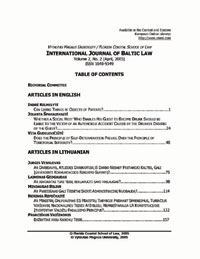Does the principle of self-determination prevail over the principle of territorial integrity?
Does the principle of self-determination prevail over the principle of territorial integrity?
Author(s): Vita GudeleviciuteSubject(s): Law, Constitution, Jurisprudence
Published by: Florida Coastal School of Law and Vytautas Magnus University School of Law
Keywords: principle; self-determination; territorial integrity
Summary/Abstract: Although the principle of territorial integrity is applied in the relations among states and, by contrast, the principle of self–determination is the right of peoples, the international community (states) while interpreting and applying the principle of self-determination is bound to the principle of territorial integrity. International legal instruments relating to self-determination invariably refer to the “peoples” as being entitled to the right of self-determination. The meaning of the term “peoples” determines who are the holders of the rights of self-determination and has a primary effect on the establishment of the harmony between the principle of self-determination and the principle of territorial integrity. In matters of territorial changes for non-self-governing territories the principle of self-determination prevails over the principle of territorial integrity only under the condition that the term “a people” means the entire population of non-self-governing territory. For cases of foreign military occupation “a people” is the entire population of the occupied territorial unit without distinction to the fact that prior to occupation this territorial unit constituted the whole territory of another state or a part of it. The principle of self-determination is recognized as unlimited to the occupied people and the occupying state cannot claim the application of the principle of territorial integrity. On the other hand, the peoples under foreign military occupation can claim the broad application of both principles. In case of non-representation by state’s government, unrepresented part of the state’s population becomes a separate people. Granting the external self-determination to unrepresented people (except to occupied) has not yet become international customary law, hence it is only declaratory. Under the present international law for unrepresented people the principle of territorial integrity prevails over the principle of self-determination. Even after recognition of the right to secede for unrepresented peoples by state practice, the principle of territorial integrity will still generally prevail if the right to external self-determination is only a remedy of last resort. If “a people” constitutes the entire population of a particular independent state, the principle of self-determination of peoples and the principle of territorial integrity both help to preserve its sovereignty and territorial unity. Generally for independent states the principle of self-determination of peoples prevails over the principle of territorial integrity only under the condition that the term “a people” means the entire population of a state. Secession happening within a single state can be analyzed as a domestic matter, and therefore, outside the international law. According to this approach, there are no limitations for who could constitute a seceding people. Secession cannot be a domestic matter if it involves peoples who live more than in one
Journal: International Journal of Baltic Law
- Issue Year: 2005
- Issue No: 2
- Page Range: 48-74
- Page Count: 27
- Language: English

